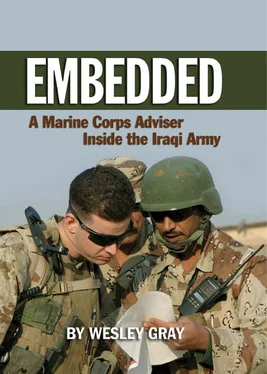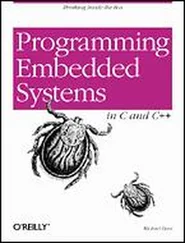My take on the observations above is that the main reasons Iraq continues to falter is not because the U.S. military isn’t trying its best but because of Iraqi culture, which sets them up for failure (or at least failure as defined by Americans: no democracy, not an ally in war on terror, not integrated into global economy, and so forth). Moreover, the American failure to understand Iraqi culture is encapsulated in my observation of the insurgent detainee. Even if Iraqis weren’t destined to fail due to their tribal-based customs, Americans, because of our desire to control and influence every situation, would never allow the Iraqis to do things the way they would like to do them, which would stymie their ability to operate effectively.
There is a now-defunct theory held by war cheerleaders that if peace and security come to Iraq, the people will somehow magically come together and want to sing “Kumbaya” in unison. This is far-fetched for a number of reasons. After studying the Iraqi people for years and working with them every day for seven months, I doubt any Iraqi in the near future will ever trust another Iraqi when money, power, or resources are at stake. I was exposed to a real-life experiment (Operation Al Majid) in the Triad that allowed us to test the war cheerleader hypothesis that bringing security to areas in Iraq would foster agreement and somehow sprout democratic institutions.
Operation Al Majid was a great success by all military standards. After it, attacks went from forty to fifty per week to a couple attacks in an entire month—more than a 90 percent drop in violence. Along with that drop in violence there was a great increase in the number of people who seemed to view coalition forces positively. There also was a steady increase in normal activity throughout the Triad: shops were opening, people were finding ways to attend schools, and more and more people were out on the streets doing normal things. In effect, Al Majid created an environment of security and relative peace and quiet.
The way the theory goes, that security and peace should foster agreement, the formation of local governments, more respect for the national government, and the sprouting of democratic institutions. But I did not see or hear of any of this happening. What I heard was that all the local sheiks continued to fight among themselves, that sheiks were trying to broker deals with the Marines to get more resources and benefits at the American taxpayer’s expense, and that people still had a complete distrust of the central government.
Nothing really changed—except who the sheiks supported. Before the sheiks had favored the religious zealots, but after the American sugar daddy came to the table, they supported us instead.
Regardless of who the sheiks support, the key factors are still the same: The Sunnis have no reason to believe in the central government, the sheiks want to maintain their little fiefdoms, local governments continue to bicker and fight amongst themselves, and nobody is willing to stand up for the nation of Iraq if it means abandoning their tribe or family.
Based on what I saw from the Triad experiment, the hypothesis that once Iraq is secure and peaceful it will sprout cooperation among the people and democratic institutions is false. I think this is because Americans apply their logic and reasoning to the situation. They assume that the Iraqi people will trust one another and choose to work with one another once the violence has ceased. But there is no historical precedent for Iraqis getting along on a national scale. Moreover, I doubt the Iraqi cultural traits of distrust, corruption, selfishness, and survivalist mentality will leave this area of the world anytime soon. Also, for the hypothesis to be true, the local sheiks and warlords who have ruled Iraq since the dawn of time must be willing to let democratic institutions flourish, knowing that this will directly degrade their power and influence over their area. The realist in me thinks this is about as likely as the pope converting to Islam.
The people in Iraq and the systems in Iraq, as they are currently established, will never become what America wants them to become. The United States came into the Iraq situation with a desire to fix the failures with American solutions. There is a problem in trying to fix Iraqi issues with American ideas: It allows the Iraqi people to blame their problems on our attempted solutions to their failed systems. What the Iraqis really need to do is be intellectually honest as to why their country is a failure. Once they realize that the faults in their system are due to a lack of initiative, lack of desire, laziness, corruption, selfishness, welfare-recipient attitude, and religious radicalism, they may be able to change from within. I do not think we can change them from outside.
Before we departed Haditha, the area left us with a final memory. Twenty minutes before our flight we were all sleeping against the cinder blocks lining the rim of the dam when an enormous jolt went through all of our bodies. The ground shook beneath our boots. Major Gaines popped his head up over the cinder block and yelled, “What the fuck was that?” Everyone jumped to see what had happened. There had obviously been an enormous explosion in our immediate vicinity. Le Gette turned to look at me and said, “Dude, how lucky are we? We’re going to die on the last day here from a fuckin’ rocket attack. Amazing!” I flashed my trademark hang loose sign and replied in a sarcastic fashion, “Oh, yeeaah. Get some!”
We looked on the landscape of the Euphrates Valley for evidence of an incoming rocket attack. A thousand meters from the dam we spotted the culprit. An enormous billow of smoke was churning from the center of a road near the dam. The EOD team had conducted a controlled detonation of multiple IEDs they had found, which included five propane tanks filled with high explosives. Adams looked at everyone on the team. “Gents, let’s get the fuck out of this place,” he said. “Where the hell is the bird!”
The bird arrived ten minutes later. I felt like William Wallace in the movie Braveheart , when he triumphantly yells out “Freeeedom” just before his execution. I boarded the CH-53 Super Stallion helicopter and screamed William Wallace’s final word, inaudible to anyone else because of the helicopter’s engine noise. I was finally free.
We were finally in Kuwait and the nightmare was over. I will never forget the flight out of the Triad. I was able to see from the sky all the areas where we had been attacked with IEDs, all the areas we had been fired upon, all the FOBs we had visited, and all the homes of people we had visited. The place was so much smaller than I had believed it to be. The Triad had been my life. It had been the center of my world. It amazed me to think that in that little slice of the world I could experience so much and learn so many new things. In the Triad we were America’s main effort. I am just now beginning to realize that Camp Ali is just another place in Iraq with two hundred hard-charging Iraqi bums trying to make a difference in a Third World land.
Being around the MiTT my last few days in Iraq made me realize something: No matter how dicked up everyone is on our team, or how idiotic or lazy people are, I still love all of them and think we had the best adviser crew Iraq has ever seen. We may not have been blessed with the most talent or that much brainpower, but we sure as hell knew how to have fun and make things happen with limited resources. For all the bitching, complaining, fighting, and hatred I had seen between the members of our team, I think circumstances brought us together as brothers in the end.
On my last day in Kuwait I focused on the beauty of McDonald’s golden arches and the many women in camp. When you haven’t seen a McDonald’s or a woman in a long time, they do wonders for you.
Читать дальше












